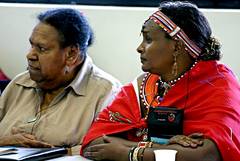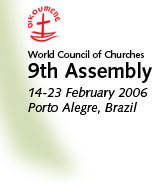 |
WCC > Home > News & media > News | ||||
| About the assembly | Programme | Theme & issues | News & media | |||||
 |
|
||||
|
13.02.06
Indigenous voices speak to the churches Pre-Assembly Indigenous People
More articles and free photos at
Indigenous people from around the globe have had a special place the church for much of its life but, all too often, place has been destructive of their physical, spiritual and cultural heritage as the first nations of the colonized world. Seen as objects of mission rather than people of the living God, these first nations are now represented in the 9th Assembly through the Indigenous Peoples Programme.
At a pre-Assembly meeting, some 50 Indigenous representatives praised the WCC´s attempts to to support millions of the world´s people who are, as one Masai participant described it, "the memory of the earth". They met with general secretary Samuel Kobia last week in pre-Assembly meetings to express their thanks and some frustrations.
In 1995, an office for Indigenous people, who come from every continent, was established at the Geneva headquarters and moved in 2003 to La Paz, Bolivia, which is one of only two countries in the world with an Indigenous majority.
Issues facing Indigenous are massive. With their deep spiritual relation to the land, they see what little is left to them, being the poorest, surrounded by development and dominated by the globalized economy. The loss of land means loss of "our rootedness". Their languages, their ways of worship, their innate spirituality and age-old cultures are rapidly being assimilated and their nations unrecognized. "We are the bearers of sacredness in our spirituality. The 21st century has lost the sense of sacredness, there are no sacred places, and the sacred people, the mothers and children, are threatened, but we know they are the ones who bring life," Kobia was told.
When Kobia arrived at their meeting of more than 50 participants, they told him "Welcome, please do not walk ahead of us or behind us, but walk as a WCC beside us and we will walk beside you."
Kobia responded by affirming his awareness of ways in which their cultures and lives had been "stolen" by academics, western knowledge seekers, anthropologists and others. "While we have UN protocols on the protection of knowledge, it does not apply to your ancient cultures and knowledge, especially in the areas of medicinal knowledge, land, spirituality and culture. Private ownership collects your knowledge but not for your good or the public good but for private gain. You must be careful when talking about sharing knowledge."
They spoke of the divisions within the churches, which further divide Indigenous people "since the days we were discovered". Kobia replied that the transformation theme of the Assembly also had to apply to transforming the churches, not just the world.
The pre-Assembly meeting had spent some time discussing the distance between their office in Bolivia, their UN advocacy work in New York and Geneva, and their distance from the WCC headquarters. Some felt this left them marginalized within the ecumenical movement, but Kobia affirmed the WCC´s commitment to the Indigenous, although he acknowledged that of the numerous promises made by the churches, many have not been fulfilled. "These are not sweet words or vague promises, we will do the practical work needed," he said.
At the end of Kobia´s visit to the Indigenous, he was presented with a sweater sent specially to the WCC Assembly by President Evo Morales, the first indigenous president of Bolivia, elected recently. The sweater became a Morales and Indigenous trademark during his successful campaign in contrast to the suits and ties of his opponents. It has now become a symbol of indigenous power.
Methodist Bishop Carlos Poma of Bolivia said he had met with President Morales before leaving for Porto Alegre and he had sent a special message to the Assembly to support and protect indigenous people against assaults by the dominant society.
At the end of the pre-Assembly gathering, a statement was prepared for the Assembly entitled "Transformation from within - Indigenous voices and the life of the church". The statement describes indigenous peoples as "the voice of the land, the voice of the water, the voice of the air," and calls for greater inclusion of indigenous peoples in WCC structures.
A statement from the meeting is available on the Assembly website:
Assembly website: www.wcc-assembly.info
|
|||
|
|
|

